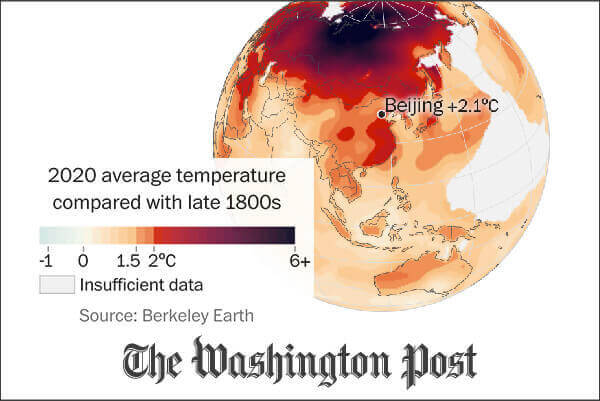As the world’s only independent, non-governmental source of comprehensive environmental data and analysis, our impact is fundamental: Our global warming and air pollution data sets and research inform high-level policy decisions, support academic research, provides inputs for education, and serve as an impartial source of data and research for the world’s leading media outlets.
World-Leading Independent Climate Science
Berkeley Earth scientists Dr. Robert Rohde and Dr. Zeke Hausfather have published peer-reviewed papers on global warming trends, methods of statistical analysis, the health impacts of air pollution, and the rise in ocean temperature. Our monthly temperature updates present global temperature and climate trends in highly accessible, visual representations. Our research, papers, reports, and other publications represent a crucial, independent, and impartial voice in the global conversation on climate and temperature trends.

Berkeley Earth Surface Temperature Data Set
Open-source from the outset, Berkeley Earth’s data sets are differentiated by a more flexible, inclusive approach for analyzing temperature observations, allowing us to incorporate data from a greater number of the world’s temperature stations. Created around our values of independence, impartiality, scientific excellence, and open-source science, our unique handling of interpolation and systematic biases helps to ensure the most detailed picture of climate change. Trusted by the UN’s Intergovernmental Panel on Climate Change (IPCC) in the2021 AR6 Report Working Group I:The Physical Science Basis, as well as the 2018 and 2019 Special Reports on Global Warming, and cited in more than 1,800 scholarly and academic papers, our surface temperature data sets are foundational to research, policy, and education. We continue to update our data sets monthly, ensuring open-source access to the highest-quality global temperature data.
The World’s Only Source for Searchable Historic Air Pollution Data
Our work on air pollution began in 2014, when we recognized that air quality was quickly becoming one of the leading public health concerns worldwide. In a 2015 paper we found that air pollution causes more than 1.6 million deaths annually in China, with a later article finding that the air quality on an average day in Beijing was the equivalent of smoking four cigarettes. Currently, our air pollution map is the world’s only source for searchable, historic air pollution data, as well as providing real-time snapshots of AQI, PM2.5 concentrations, and other air quality indicators worldwide.


A Trusted Source for Pulitzer-Prize Winning Media Coverage
Regularly cited by The New York Times, Bloomberg, The World Economic Forum, MIT Technology Review, and others, Berkeley Earth’s independent data and analysis serve as a source of high-quality, accurate, and impartial climate data and analysis for the world’s leading media outlets. Berkeley Earth’s data set was used as a source of data for the Washington Post’s 2020 Pulitzer-Prize winning series on climate change, 2°C:Beyond the Limit. Through our trusted relationship with the world’s leading media outlets we are able to share our findings with millions of readers around the world, amplifying our global reach and influence.
Making Climate and Data Science Accessible
The highly accessible nature of our open-source research and data allows our impact to expand beyond the scientific, policy, and media communities. Our Skeptics Guide to Climate Change, created in 2014 to address the common objections of climate skeptics in an accessible, evidence-based manner, continues to receive the highest traffic on our website. In June of 2020 Paraguay-based fashion designer Emma Viedma, in conjunction with World Wildlife Fund Paraguay, transformed Berkeley Earth’s data visualizations into The Global Warming Collection, couture pieces designed to raise awareness of global warming; this collection was recognized by Fast Company as a World Changing Idea in March 2022. Paris-based developer Amaury Martiny and designer Marcello Coelho used Berkeley Earth’s research on air pollution and cigarette equivalence to inform their “Sh**t I Smoke!” App, a highly engaging, user-friendly app that presents local air quality in terms of cigarettes smoked, creating urgency and context around this crucial issue. And our surface temperature data set is used by data science students worldwide on Kaggle, a data science learning platform, providing valuable climate analysis experience to thousands of independent and institutional students alike.


COVID-19 Research in 2020
In 2020, as worldwide data and information became available, we collected and analyzed the impact of the COVID-19 global pandemic and its relationship to global warming, weather, climate, air quality, economic impact, and health.





